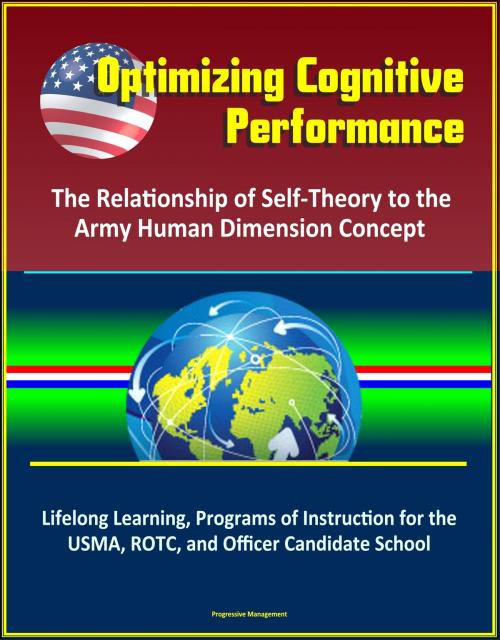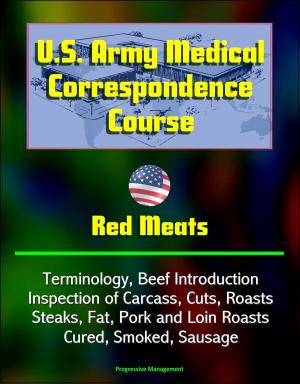Optimizing Cognitive Performance: The Relationship of Self-Theory to the Army Human Dimension Concept - Lifelong Learning, Programs of Instruction for the USMA, ROTC, and Officer Candidate School
Nonfiction, History, Military, United States, Reference & Language, Education & Teaching, Educational Theory| Author: | Progressive Management | ISBN: | 9781370212965 |
| Publisher: | Progressive Management | Publication: | January 24, 2017 |
| Imprint: | Smashwords Edition | Language: | English |
| Author: | Progressive Management |
| ISBN: | 9781370212965 |
| Publisher: | Progressive Management |
| Publication: | January 24, 2017 |
| Imprint: | Smashwords Edition |
| Language: | English |
This excellent report has been professionally converted for accurate flowing-text e-book format reproduction. The U.S. Army Human Dimension Concept, published in May of 2014, presents the challenge of optimizing human performance in an increasingly complex and urbanizing world where Soldier interactions may have strategic effects. In addressing this challenge, the Human Dimension Concept presents three components of the solution: cognitive, physical, and social. This study explores the cognitive component of the solution using a qualitative, case study methodology to understand how the Army may optimize cognitive performance. Literature supports the assumption that an incremental self-theory of intelligence, also known commonly as the growth mindset, is required to optimize cognitive performance. As the Army seeks to create a culture of lifelong learning, this study explores the inclusion of self-theory within the desired outcomes of the three primary Army commissioning sources. This study finds that self-theory is not included within the guiding policies, regulations and doctrine guiding the programs of instruction at the U.S. Military Academy, the Reserve Officer Training Corps, and the Officer Candidate School.
ACRONYMS * CHAPTER 1 - INTRODUCTION * Background * Historical Context * The 2014 Human Dimension Concept * The Combined Arms Center White Paper on the Human Dimension * The Army Profession and Ethic * Statement of the Problem * Research Questions * Research Design * Assumptions * Definition of Terms * Limitations * Role of the Researcher * Expected Impact and Significance of the Study * Statement of Purpose * CHAPTER 2 - LITERATURE REVIEW * Purpose * The Cognitive Component * IQ and EQ * The Fixed and the Growth Mindset * The Effects of Testing on the Learner * "Grit" as Related to the Growth Mindset * The Importance of Mindset for Leaders, Educators, and Trainers * Summary and Conclusions * CHAPTER 3 - RESEARCH METHODOLOGY * Purpose * Overview * Research Methodology * Data Sources and Collection Procedures * Data Analysis * Summary * CHAPTER 4 - ANALYSIS * Purpose * Identifying Mindsets: Defining the Search * Basic Officer Leaders Course Alpha (Pre-Commissioning Training) * United States Military Academy * U.S. Army Cadet Command * United States Army Officer Candidate School * The Army Leadership Requirements Model * Growth and Fixed Mindset in the General Population * Summary and Conclusions * CHAPTER 5 - CONCLUSIONS AND RECOMMENDATIONS * Purpose * Findings * Implications * Recommendations * Summary * BIBLIOGRAPHY * FOOTNOTES
This excellent report has been professionally converted for accurate flowing-text e-book format reproduction. The U.S. Army Human Dimension Concept, published in May of 2014, presents the challenge of optimizing human performance in an increasingly complex and urbanizing world where Soldier interactions may have strategic effects. In addressing this challenge, the Human Dimension Concept presents three components of the solution: cognitive, physical, and social. This study explores the cognitive component of the solution using a qualitative, case study methodology to understand how the Army may optimize cognitive performance. Literature supports the assumption that an incremental self-theory of intelligence, also known commonly as the growth mindset, is required to optimize cognitive performance. As the Army seeks to create a culture of lifelong learning, this study explores the inclusion of self-theory within the desired outcomes of the three primary Army commissioning sources. This study finds that self-theory is not included within the guiding policies, regulations and doctrine guiding the programs of instruction at the U.S. Military Academy, the Reserve Officer Training Corps, and the Officer Candidate School.
ACRONYMS * CHAPTER 1 - INTRODUCTION * Background * Historical Context * The 2014 Human Dimension Concept * The Combined Arms Center White Paper on the Human Dimension * The Army Profession and Ethic * Statement of the Problem * Research Questions * Research Design * Assumptions * Definition of Terms * Limitations * Role of the Researcher * Expected Impact and Significance of the Study * Statement of Purpose * CHAPTER 2 - LITERATURE REVIEW * Purpose * The Cognitive Component * IQ and EQ * The Fixed and the Growth Mindset * The Effects of Testing on the Learner * "Grit" as Related to the Growth Mindset * The Importance of Mindset for Leaders, Educators, and Trainers * Summary and Conclusions * CHAPTER 3 - RESEARCH METHODOLOGY * Purpose * Overview * Research Methodology * Data Sources and Collection Procedures * Data Analysis * Summary * CHAPTER 4 - ANALYSIS * Purpose * Identifying Mindsets: Defining the Search * Basic Officer Leaders Course Alpha (Pre-Commissioning Training) * United States Military Academy * U.S. Army Cadet Command * United States Army Officer Candidate School * The Army Leadership Requirements Model * Growth and Fixed Mindset in the General Population * Summary and Conclusions * CHAPTER 5 - CONCLUSIONS AND RECOMMENDATIONS * Purpose * Findings * Implications * Recommendations * Summary * BIBLIOGRAPHY * FOOTNOTES















